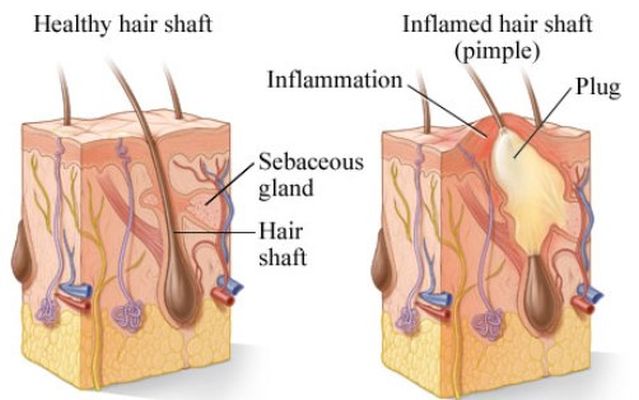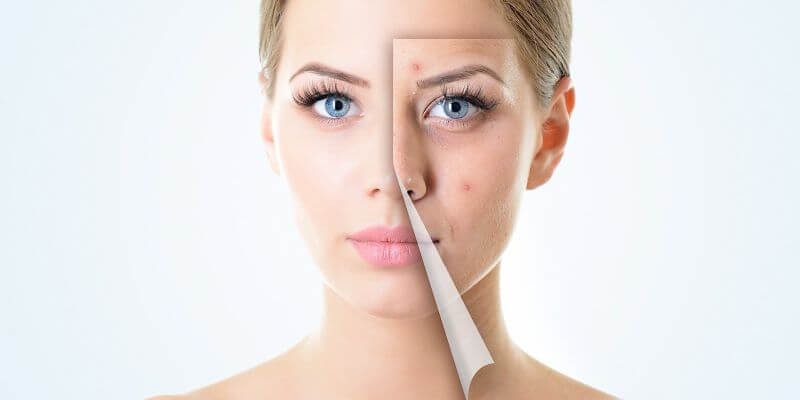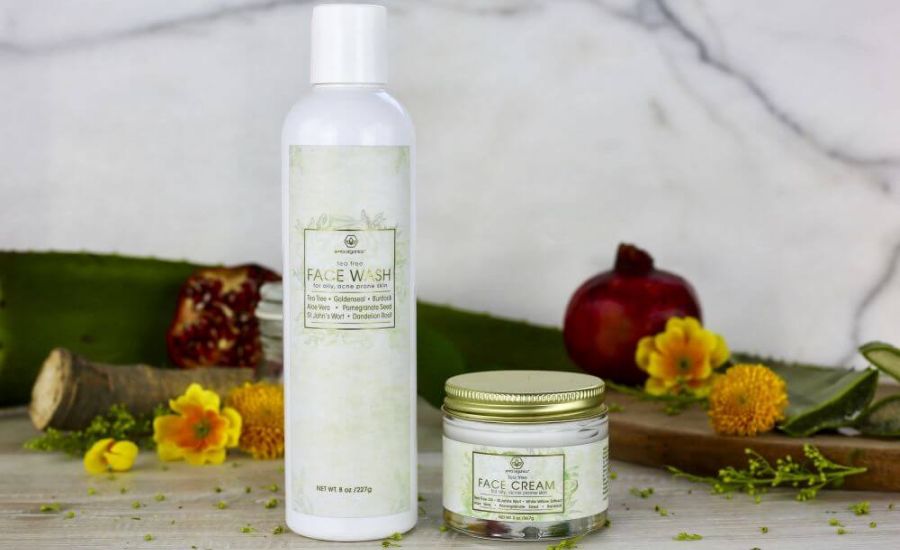From a small zit to a major breakout, pimples are a pain. Here is the truth behind what causes acne and how to beat it.
Table of contents:
Acne 101.
What is causing acne.
Preventing Acne.
Regardless if you’re contending with one small zit or multiple blackheads, getting rid of acne can be a struggle. The pain, constant zit-popping, and scarring is enough to make anyone scour the Internet for treatment plans to this common skin problem.
Unfortunately, there are just as many false causes as there are actual culprits. It’s good to know what’s really causing your acne so your can find a solid treatment plan to manage it.
But before getting into common myths about the causes of acne, let’s explore what it actually is and what you need to know about it.
Acne 101
Acne Vulgaris (commonly known as acne) occurs when oil glands and dead skin accumulate at the base of a hair follicle. This accumulation turns into a blockage in the follicle, resulting in a pimple.
These oil glands, known as “sebaceous glands,” are connected to your skin’s pores via hair follicles. They produce “sebum” to help lubricate the skin and hair. It is produced by male hormones.
While acne is most present in teenagers during puberty, anyone can fall victim to it. In fact, the American Academy of Dermatology states that 50 million people are affected with acne yearly. People of any age and ethnic background can experience some degree of acne.
There are several factors that could promote this very common skin disease. But first, let’s debunk some common misconceptions of why acne occurs, what causes pimples, and most importantly, real treatment plans to fix the problem.
Myth 1: Dirty Skin
While dirty skin can cause irritation, it doesn’t cause breakouts. Acne occurs underneath the skin, inside the pores and hair follicles. The end result, pimples and zits, occur on the outer layer of the skin. So dirt could irritate existing acne on the skin but it does not cause it.
The bacteria responsible for acne, Propionibacterium acnes (or sometimes called p. acnes) is already present in the body. And once sebum interacts with p. acnes, acne spreads.
According to The Mayo Clinic, dirt on the skin plays no part in promoting acne. So regardless of how much mud, grass, or dust is lying on your skin, it’s not the cause of your pimples.
Myth 2: Foods That Cause Acne
We’re all guilty of enjoying chocolate, candy, potato chips, and other junk food. And while it’s not good for the body to have all these sugary, oily foods, that doesn’t mean they are causes breakouts.
Much like the debunked dirty skin culprit, acne is occurring beneath the skin due to oil build up. Simply because the body consumes sugary or oily foods, doesn’t mean the oil is getting transferred from the stomach to the pores. Eating little bits here and there aren’t likely to cause a breakout.
However, if you are eating too much of these foods they can lead to an unhealthy body, include your skin. The human body is a complex organism and too much of certain foods can result in an imbalance which can lead to skin problems.
You can learn more here: Foods to Avoid if You’re Struggling With Damaged Skin
Myth 3: Poor hygiene
Because acne is associated with a lack of hygiene, it’s easy to assume that a person with acne is not washing their face well. This “fact” simply holds no water.
According to WebMD, washing your face more than once a day is beneficial, but it doesn’t mean keeping your face clean will clear up acne. A botanical face wash will help wash away excess oil and nourish your skin. But cleansers aren’t working on your face all day long. They rinse the skin for a few seconds and then it’s back to being exposed to the environment.
So, skipping out on washing your face multiple times a day isn’t a real cause to acne. In fact, too much could cause dry outs, which could irritate your face even more.
Myth 4: Sunscreen
While everyone heading out for fun in sun should be wearing sunscreen, it’s a common misconception that it’s also an acne-causing agent. Unlike the others listed, there’s partial truth here.
According to acne.org, the sun is more likely to irritate your acne, not the sunscreen. This is because a sun burn could promote new breakouts. Now, there are sunscreens that are safe for acne-prone skin and there are others that are believed to cause breakouts.
The active ingredient in sunscreen won’t cause blockages that could lead to acne. However, other ingredients could. To be on the safe side, try to find a sunscreen with the following attributes:
- SPF of at least 15
- Jojoba oil (a great moisturizer for acne-prone skin)
- Moisturizing properties
- Natural
And be sure to stay away from sunscreens with ingredients known to cause skin problems.
Myth 5: Exercise
Many people believe that exercising can cause acne. But WebMD says exercise could reverse it.
Physical activity can help generate more oxygen in the blood, carrying waste away. It also reduces stress hormones in the body. Sweat is made mostly of water and can contain salt, ammonia, and sugar, so even if it was absorbed back into the pores, it’s unlikely to clog them. Bathing after a workout is more about being clean than preventing breakouts.
Every person has a balance of male and female hormones. There are numerous hormones in the body but two of the most common ones are androgen and estrogen.
As discussed earlier, acne develops when oil builds up in a hair follicle. Doctors have noticed an increase in sebum production when there’s an increase in androgens. And androgens begin raging during teenage years, hence why teens are more prone to acne.
Controlling hormones is pretty difficult because they are naturally occurring. But if you feel you’re having an acne breakout due to your hormones, visit a dermatologist so they can put you on a treatment plan.
Cause 2: Your pH Balance Is Off
Your potential hydrogen (or pH) measures the amount of acid in your body. The scale runs from 0-14, with 0 being the most acidic level and 14 being the most alkaline.
If you experience very dry skin, it is too alkaline. If your skin is inflamed or oily, you have acidic skin, so your pH levels may be too low.
So, what does this have to do with acne? When your skin’s pH levels are off, acne breakouts can occur at a vicious rate. Your skin enjoys a comfortable pH of 5.5.
If you want to balance your skin’s pH you should find what is causing the problem. We have an easy to follow guide on your skin’s pH levels that will help get things under control.
Cause 3: Menses
Young women experience changes in their hormones as well as during menstruation. According to WebMD, as many as 63% of women experience menstrual acne flare ups.
During this monthly process, testosterone levels are pretty high. Testosterone is strongly believed to have an affect on the increase in sebum production, hence, the possibility of zits during a woman’s period.
You can take medication like birth control, spironolactone, or accutane to help keep hormones at bay and reduce menstrual acne. We only recommend this if it’s severe. Light acne that happens once a month may not be worth the possible health risks from taking drugs.
Cause 4: Certain Medications
A medication to fix one issue could cause another. For example, steroidal medications regulate hormones. This hormonal regulation could cause an increase in testosterone, which could affect sebum levels in the skin.
If you are on any medication check with your doctor to see if it could be causing your skin breakouts.
Cause 5: Stress Acne
When we are anxious or experiencing some type of unnatural strain, the body produces more cortisol and adrenaline, which are stress hormones.
WebMD states that in a 2003 Stanford University study, students experienced more flare-ups during exams than during periods without exams. These students likely had a rage of cortisol and adrenaline in their bodies because of the stress that testing brings.
The stress-acne association is more commonly associated with folks who already have acne; it’s not usually a cause of the disease. However, stress is arguably a cause of acne flare-ups being more difficult to manage.
While reducing your stress would be the obvious answer, because stress is more of an instigator and not a culprit to acne, other treatments would be necessary. Start an exercise regimen or relaxing activity in addition to proper skin care.
Preventing Acne
While acne is not always preventable for everyone, it’s certainly manageable. Follow these steps below to prevent and better manage your acne:
1. Get educated about acne. There’s a lot of so-called “old-wives” tales to what causes acne. Know what’s legit and what’s not before you waste energy on worthless claims.
2. Use a plant-based face wash and mild moisturizers on your face. Harsh soaps can irritate or dry the skin out, making your situation even worse. If you want to use something extra-strength for acne then go with a tea tree cleanser and tea tree cream.
3. Maintain a healthy exercise and hygiene routine. Get a run or nice walk in a couple times a week. Additionally, be sure to wear an appropriate sunscreen if the weather is hot. Shower immediately after an exercise and wash your face when you feel it getting too oily.
4. Maintain a healthy diet. While food won’t directly impact your skin, overall health can. A poor diet can lead to imbalances that promote acne breakouts.
5. Use pH balancing products on your face. If your products are too acidic or alkaline, your skin will be too. Check the labels on cleansers and moisturizers for its pH balancing benefits.
6. Ask more questions about medications you’re taking. While a medication may be fixing one issue, it could be sparking another. Be sure you know all the side effects to all your medications.
7. Don’t be scared to chat with your doctor about your menstrual acne. Chances are, he or she can prescribe you birth control, spironolactone, or Accutane to control the flare-ups if needed.
The best start to managing acne is being educated about it. Knowing what happens in the body, why it happens, and how it affects acne can give you more reassurance about dealing with it. Additionally, knowing what is really causing it and what’s not helps plan your treatment options.
You know now the basic do’s and don’ts when dealing with your skin. Find out what is causing your breakouts and get working on clearing skin today!
And don't forget to check out the collection of plant-based acne products we've discussed.



